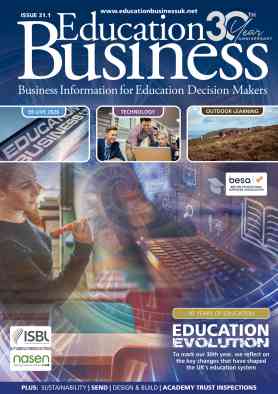Beyond the classroom

“I personally find organising trips very stressful and sadly it’s easier (and of course cheaper) not to do it at all.” This is what one teacher said last year when English Heritage conducted a survey to find out why some schools were not re-visiting our properties on free entry school visits.
So how can organising trips be made easier and cost-effective? Given that school budget cuts, coach costs, changes in the curriculum cycle, staff cover, and health and safety legislation are largely beyond the control of out-of-the-classroom attractions, what exactly can be done to make school trips as painless and pleasurable as possible for those who want to undertake them?
Creating memories
By offering all pre-booked learning groups free entry to over 400 historic properties in our care, we aim to take the cost “sting” out of memorable outside the classroom learning experiences. We can’t do anything about the weather but to make risk assessments less of a nightmare, we normally e-mail group leaders a hazard information sheet for each site, together with the free entry permit which can also be used for a free familiarisation visit. We even offer learning groups leaders 20 per cent off site guidebooks that they can buy to help prepare for the class visit.
At English Heritage we’ve found that offering free site entry and information simply isn’t enough. There’s also the need to convince some teachers of the huge and proven value of outside-the-classroom learning in general, let alone how historic sites in particular can be used for a range of cross-curricular opportunities.
Newly-qualified teachers are particularly hard nuts to crack. With little or no experience of either the new local area they invariably find themselves in or of teaching history, many are understandably anxious about both. We need to help them find what they want as easily as possible and convince them of the value and ease of conducting a self-led visit – and this means making the experience as appealing as possible right from the start.
Websites and booking systems
A good website is essential for an effective pre-visit experience. It should meet the needs of learning group leaders looking for places to visit, facilities and resources. But even finding a website can be a problem and search optimisation, menus, content, positioning and links should be under constant review. With a choice of 400+ different properties, all with different features and many with different opening times, on-site facilities, activities and resources, making this operation a simple one is complicated and we still have a long way to go.
Bookings systems should also be customer-focused and easy to use to prevent people from turning away at the first post. Our online system is constantly reviewed and we act quickly if people find problems with it but there is always scope for improvement. We hope that next year’s move to centralised phone bookings will improve the user-friendliness of all bookings options.
Learning through doing
All children should have the opportunity of a hands-on history experience, to understand, value and therefore want to care for their local heritage. It’s the job of the education team to make this as easy and effective as possible on school trips because as one teacher on a recent self-led visit put it: “To actually run around in a castle and hear the noises that are made, to touch the walls, to feel everything – you just cannot put that learning into a classroom, it’s impossible.”
To make getting out there as easy as possible, and give teachers a break from having to do all the planning, some of our sites offer the option to book interactive, expert-led Discovery Visits (£90 per group) that support national curriculum learning across a range of topics and key stages. These are universally popular as they enable learners to experience life as royals, knights, monks, soldiers and servants or become history, maths, art or even garden detectives at actual Roman, medieval, Tudor and Victorian sites.
Our feedback confirms that children develop enquiry, team building and communications skills and learn more from Discovery Visits than they do in the classroom. They like and remember the experience too. “The children enjoyed it; I learnt a lot as well. This was so real. It was excellent,” said a Year 6 teacher of a Discovery Visit at Pendennis Castle.
“The best school trip ever,” commented learners on a Discovery Visit at Beeston Castle.
Fun & play
We believe that fun and play should be integral to a learner’s development. “Learning is active engagement with experience. For very young children play is the main medium through which they learn,” explains education director Sandra Stancliffe.
“Heritage learning encompasses a huge set of skills – not just learning facts about history but understanding how people operate and interact with their environment”, adds Pippa Smith, head of education. “If you tell children something, maybe one or two will remember the facts. If you help them investigate and find things out for themselves, 90 per cent of them are going to remember the facts. Making a connection between a theoretical fact and a practical reality is key – and that’s where English Heritage can really support.”
A short new film showing what can be accomplished through play (and what learning looks like at English Heritage properties) can be seen on the English Heritage website.
Not surprisingly, Discovery Visits are particularly appreciated by teachers who do not have the time to plan sessions for their groups or fear that their historical knowledge is not up to scratch – although our richly illustrated property information and teachers’ kits (also sent to bookers and downloadable from the website) can help with both problems. They offer a wealth of historic and site details as well as lesson ideas to help non-experts make the most of all self-led visits.
Making the offer more attractive
When we recently asked teachers if there was anything we could do to make this education offer more attractive just under 50 per cent voluntarily said “it’s great as it is”, while the remainder mainly wanted reductions in transport costs as well as less bureaucracy.
To help address this we have in the past introduced campaigns like “save our school trips” and “introduce a learning group” (whereby successful claimants received 50 per cent off their transport costs). We are now looking into different ways we may be able to help encourage the use of public transport.
On-site facilities
Activity-packed local heritage trails, new-look teachers’ kits, inspiring films, on-site handling collections and activities, flip cameras and GPS units – these are some of the exciting new learning resources and items currently under development to help bring to life even the most esoteric mounds and ruins and make trips to them a breeze.
Most of our major properties have indoor education spaces or store/lunch rooms that education groups can use as learning bases for the day and nearly all have toilets, parking and plenty of space to let off steam. Cafes and shops also offer well-deserved refreshments for teachers and helpers, and souvenirs for all to remind them of what we hope they will long remember as a happy and rewarding trip. Shops can often provide the icing on the cake for a successful school trip – some even provide lunch or goody bags if pre-booked.
Learners at some of our most amazing properties will soon be able to track down significant sights and objects using GPS units and express their creativity with flip cameras loaned out to them during free entry visits. Costume and handling collections and activity bags will also be offered at an increasing number of sites, such as the interactive guide book and object collection at Warkworth Castle and our first traditional building methods pack at Launceston Castle.
New interactive heritage trails, designed to expand a site visit into a fulfilling day-long trip, are also being developed. These address teachers’ preferences for a full day covering environmental and other activities to make the most of school trips and offer the chance to undertake stimulating activities and develop new insights and skills while finding out about the changing face of towns. A trail for Whitby can already be downloaded and trails for Deal, Great Yarmouth and more will soon be available, aimed primarily at Key Stage 2-3 pupils.
For those based in different parts of the country there’s normally a castle, abbey or other site of historical significance not far away and free entry visits to our 400 heritage sites can offer amazing cross-curricular learning experiences all over the country. By offering them and constantly reviewing and improving our website and booking procedures, providing free hazard and historical site information, familiarisation visits and useful downloadable resources, and introducing new site-based activities and resources, we aim not only to reduce the costs and stress of trips but also to make them as easy to organise and as beneficial as possible for all involved.
For more information
www.english-heritage.org.uk/education
Latest News
10/02/2026 - 09:47
Spending on schools across Scotland has increased by more than £1 billion in real terms over the past decade, statistics show.
10/02/2026 - 09:34
New training to empower school staff to improve mental health and wellbeing support for neurodivergent students has been launched by Anna Freud, a mental health charity transforming care for children and young people.
09/02/2026 - 09:58
Data from BAE Systems’ annual Apprenticeship Barometer found that 63% of parents said they would prefer their child to choose an apprenticeship over a degree after school.
06/02/2026 - 09:59
The work builds on guidance launched by Cardiff Council in autumn 2025, which provides clear and practical advice for schools responding to incidents where weapons are brought onto school premises.
05/02/2026 - 10:40
Schools are invited to take part in a practical, hands-on roundtable at Education Business LIVE 2026, exploring the complex relationship between wellbeing, attendance and behaviour in schools.







